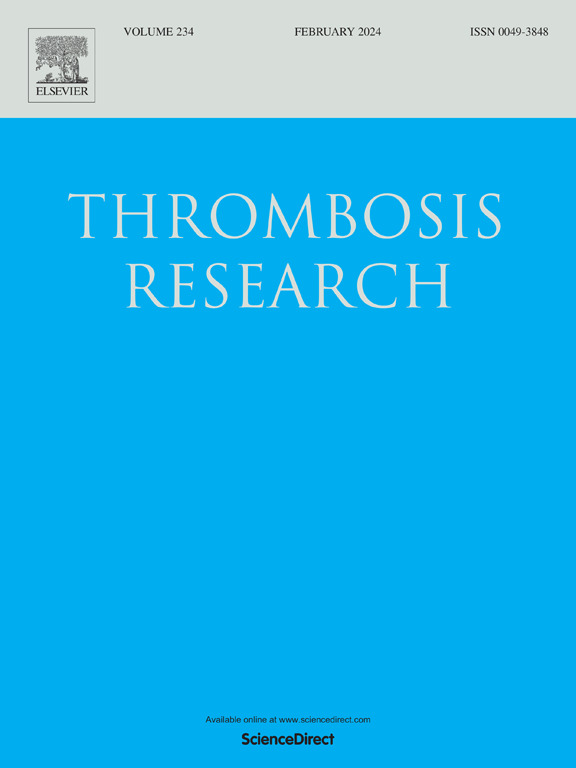美国各机构抗血小板药物指南围手术期管理的比较分析
IF 3.4
3区 医学
Q1 HEMATOLOGY
引用次数: 0
摘要
心血管疾病(CVD)是世界范围内死亡的主要原因,促使抗血小板药物越来越多地用于一级和二级预防。尽管多个专业协会都有关于抗血小板药物围手术期管理的指导方针,但我们假设它们的实施各不相同,导致美国围手术期实践不一致。方法:我们调查了美国静脉血栓栓塞网络(VENUS)系统血液学委员会的11名成员,以收集他们机构关于非心脏手术围手术期抗血小板药物管理的指南。机构指南与五个专业协会指南进行了比较。结果在11个学术医疗中心(amc)中,8个(72.7%)有非心脏手术前抗血小板药物(阿司匹林和3种P2Y12抑制剂)围手术期管理的制度性指南。其余3例中,2例在介入放射治疗前(n = 1)和轴向麻醉前(n = 1)有抗血小板药物管理指南。五个amc对围手术期磷酸二酯酶抑制剂的管理提出了不同的建议,而五个社会指南中没有一个解决这些问题。五个amc对术后恢复抗血小板药物的时间提供了不同的建议,根据出血风险从尽快到术后12-24小时不等。只有两个amc对那些有危及生命的围手术期出血或进行紧急高危手术的患者提供了抗血小板药物的建议。结论医师对非心脏手术前围手术期使用抗血小板药物的建议存在差异。需要进一步的研究来确定这种可变性是否会影响患者的预后,并确定改进指南实施的方法。本文章由计算机程序翻译,如有差异,请以英文原文为准。
Comparative analysis of perioperative management of antiplatelet agent guidelines across US institutions
Introduction
Cardiovascular disease (CVD) is the leading cause of mortality worldwide, prompting increasing use of antiplatelet agents for primary and secondary prevention. Despite guidelines from multiple professional societies on the perioperative management of antiplatelet agents, we hypothesized that their implementation varies, leading to inconsistencies in perioperative practices across the United States (US).
Methods
We surveyed eleven members of the Systems-Based Hematology Committee of the Venous ThromboEmbolism Network US (VENUS) to gather their institutions' guidelines on the perioperative management of antiplatelet agents for non-cardiac surgery. Institutional guidelines were compared with five professional society guidelines.
Results
Of the 11 academic medical centers (AMCs), 8 (72.7 %) had institutional guidelines on perioperative management of antiplatelet agents (aspirin and three P2Y12 inhibitors) prior to non-cardiac surgery. Of the remaining three, two had guidelines on the management of antiplatelet agents prior to interventional radiology procedures (n = 1) and for neuraxial anesthesia (n = 1).
Five AMCs gave differing recommendations on managing phosphodiesterase inhibitors perioperatively, while none of the five society guidelines addressed them.
Five AMCs provided variable recommendations on the timing of postoperative resumption of antiplatelet agents ranging from as soon as possible to 12–24 h postoperatively depending on bleeding risk.
Only two AMCs provided recommendations for those on antiplatelet agents who have life-threatening peri-operative bleeding or undergoing urgent high-bleeding risk surgery.
Conclusion
AMCs vary in their recommendations on the perioperative management of antiplatelet agents prior to non-cardiac surgery. Further research is needed to determine if this variability impacts patient outcomes and to identify ways to improve guideline implementation.
求助全文
通过发布文献求助,成功后即可免费获取论文全文。
去求助
来源期刊

Thrombosis research
医学-外周血管病
CiteScore
14.60
自引率
4.00%
发文量
364
审稿时长
31 days
期刊介绍:
Thrombosis Research is an international journal dedicated to the swift dissemination of new information on thrombosis, hemostasis, and vascular biology, aimed at advancing both science and clinical care. The journal publishes peer-reviewed original research, reviews, editorials, opinions, and critiques, covering both basic and clinical studies. Priority is given to research that promises novel approaches in the diagnosis, therapy, prognosis, and prevention of thrombotic and hemorrhagic diseases.
 求助内容:
求助内容: 应助结果提醒方式:
应助结果提醒方式:


